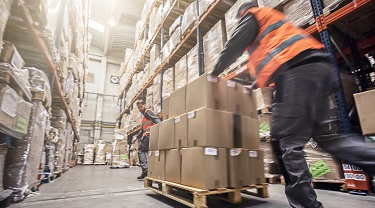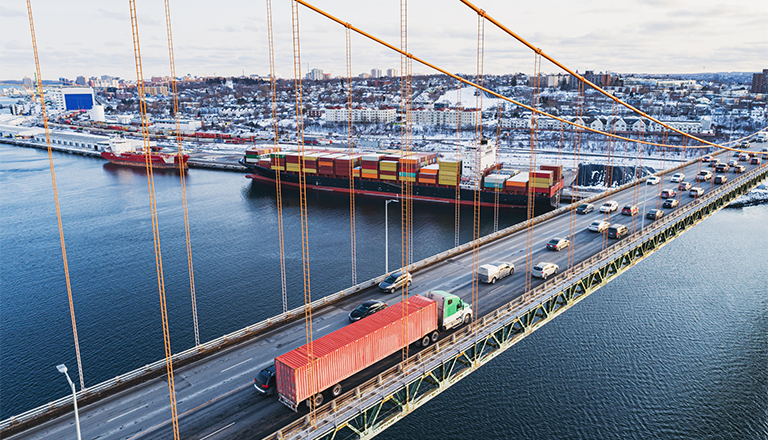This is the second article in a four-part series on Incoterms 2020, the universal trade terms used in sales contracts worldwide to prevent misunderstandings between buyers and sellers. Today, we take a closer look at the free carrier rule.
It’s a simple case of how, when, where.
Like all of the 11 Incoterms drafted by the International Chamber of Commerce (ICC), the free carrier or FCA rule was designed to eliminate confusion in sales contracts and clearly define the roles and responsibilities of buyers and sellers of export goods.
With FCA, it’s all in the details: Exporters must identify how, when and where they’ll make their goods available to buyers. For example, goods will be delivered by air on a specific date to a loading dock at the buyer’s warehouse or a third-party facility.
You should also check out
Expand your understanding of the 11 universal trade terms used in global sales contracts and how they impact your business operations.
Under FCA, when the place of delivery is the seller’s premises, the seller is responsible for loading the goods onto a truck or other transport vehicle. This is one of the key differences between Ex Works (EXW) and FCA when it comes to loading goods. Often, exporters default to EXW (specifically factories in Europe), but if they’re loading the goods, the correct term should be FCA.
When the place of delivery is elsewhere, delivery is completed when the goods, which have been loaded on the seller’s means of transportation, arrive at the named location and are ready to be unloaded by the carrier or other person identified by the buyer.
In either case, once the goods have been delivered by the seller, the buyer is responsible for all the risk of loss or damage to the goods. The key to the FCA rule is to specify the delivery point in the sales contract, which is where the Incoterms must be refined if needed.
Responsibilities under FCA
For the buyer
- Provide the seller with the name of the carrier (or other specified person) to deliver the goods
- Designate the time when the carrier will receive the goods
- Identify the mode of transport to be used and the location where the goods will be received
- Perform freight and international transport arrangements. In Canada, this means that an exporter should file an export declaration via the CanadianExport Reporting System (CERS) if goods are valued at C$2,000, or more, and they’re destined to any country other than the United States, Puerto Rico or the U.S. Virgin Islands.
For the seller
- Package and mark the goods for transport and any associated costs
- Inform the buyer when the goods have been delivered
- Notify the buyer if the carrier or another person specified by the buyer has failed to take the goods within the agreed time period
- Clearing customs for exports if required by the export country
What’s different about FCA?
Free carrier addresses one specific situation in which goods are sold FCA for delivery by sea and the buyer or seller requests a bill of lading with an onboard notation. Article A6/B6, the delivery/transport document, allows the buyer and seller to agree that the buyer will instruct the carrier to issue an onboard bill of lading to the seller as soon as the goods have been loaded onboard. It also allows for the seller to tender this document to the buyer.
Who’s responsible for the loss?
Let’s say a Canadian wheat exporter in Manitoba is selling to an American buyer. Using FCA, the contract states that the goods will be available for pick up at the exporter’s warehouse in Manitoba in loading bay No. 1, between 4 and 5 p.m. on Jan. 15, 2024. On the date of the scheduled pickup, the seller places the goods in front of loading bay No. 1 of their warehouse at 4 p.m. But the buyer doesn’t show up until Jan. 16 at 1:45 p.m. and can’t access the specified loading bay because the fire department is onsite to put out a truck fire. The goods have been destroyed because they’ve been sitting in the loading bay since the previous day.
Under FCA, if the place of delivery is the seller’s premises, then it’s the seller’s responsibility to load the goods onto a truck (or other transport vehicle). Since they didn’t in this case, the goods weren’t delivered according to the Incoterm rules and therefore, they’re responsible for the loss.
For more information about free carrier and the other 10 Incoterms, see the official Incoterms rule book. The ICC has also created an Incoterms 2020 app, which gives you easy access to a wealth of practical information on your mobile device.
For more information about Incoterms, visit EDC’s Export Help Hub.
Continue series

Part 3 of 4 in series
Incoterms 2020: Understanding the Group C rules
Continue seriesPart 4 of 4 in series
Incoterms 2020: Understanding the Group D and FOB rulesPart 1 of 4 in series
Incoterms 2020: Understanding the Ex Works rule





